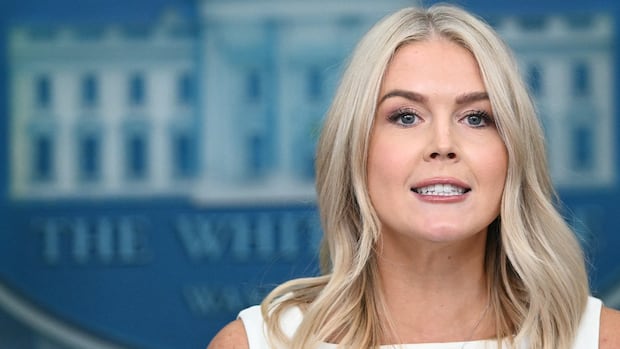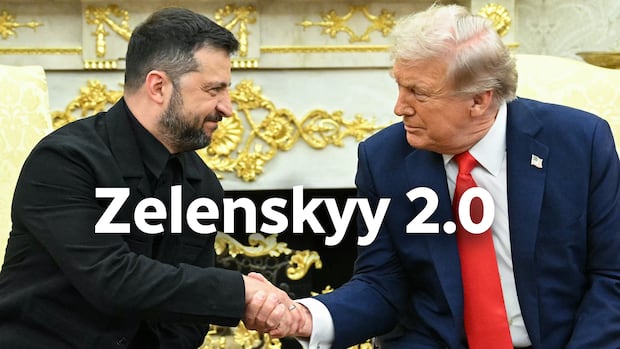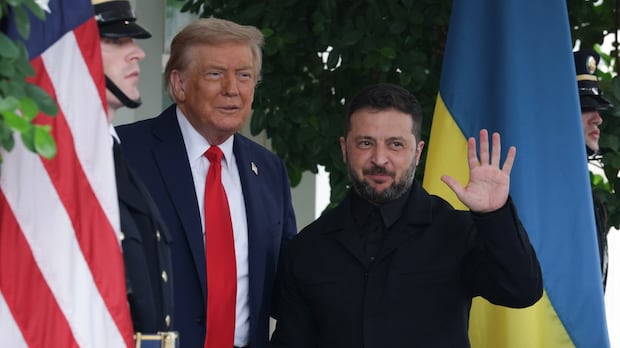Russia said Wednesday attempts to resolve security issues relating to Ukraine without Moscow’s participation were a “road to nowhere,” and that much diplomatic work needs to be done before Vladimir Putin and Volodymyr Zelenskyy are ever in the same room.
Russia Foreign Minister Sergei Lavrov particularly criticized the role of European leaders who met U.S. President Donald Trump and Zelenskyy at the White House on Monday to discuss security guarantees for Ukraine that could help to end the 3½-year-old war.
“I am sure that in the West, and above all in the United States, they understand perfectly well that seriously discussing security issues without the Russian Federation is a utopia, it’s a road to nowhere,” Lavrov told a news conference.
The White House says it is working to secure a meeting between the presidents of Russia and Ukraine, which both have agreed to, while plans continue to create security guarantees for Ukraine.
Trump met with Putin in Alaska last Friday. The leaders of Britain, Germany, France, Italy and the European Union and NATO then agreed to descend on Washington along with Zelenskyy, after Trump appeared to abandon a stance favouring a ceasefire be agreed to before work on a comprehensive peace deal.
Lavrov accused the European leaders who met Trump and Zelenskyy of carrying out “a fairly aggressive escalation of the situation, rather clumsy and, in general, unethical attempts to change the position of the Trump administration and the president of the United States personally…. We did not hear any constructive ideas from the Europeans there.”
The White House has both floated the idea of a trilateral summit involving Trump, Putin and Zelenskyy, or a bilateral meeting between the Russian and Ukraine leaders. But Lavrov repeated Moscow’s insistence that any meeting with Putin and Zelenskyy present should be the culmination of negotiations, preceded “step by step, gradually, starting from the expert level.”
Russia and Ukraine delegations have met during the course of the war, including sessions this spring and summer in Turkey. Since then, there have been multiple exchanges between the countries of war prisoners and war casualties.
Putin and Zelenskyy have only met in person once, in 2019, three years before Russia launched its invasion.
Front BurnerIs Trump any closer to ending the war in Ukraine?
U.S., Euro leaders ponder security guarantee specifics
Following the White House summit, a series of virtual conferences took place on Tuesday that included leaders of countries not present in Washington, including Canadian Prime Minister Mark Carney.
Kyiv’s European allies are looking to set up a force that could backstop any peace agreement, and a coalition of 30 countries have signed up to support the initiative.
When Volodymyr Zelenskyy visited Washington this time, speaking before a room full of reporters and cameras, there was no shouting, no accusations of ingratitude and no mention of gambling with World War III. Andrew Chang breaks down how the Ukrainian president kept his meeting with Donald Trump on track and avoided another Oval Office meltdown.
Images provided by Getty Images, The Canadian Press and Reuters.
On Wednesday, defence chiefs from the 32 NATO alliance members will hold a video conference amid the diplomatic push to end the fighting in Ukraine.
Trump said Monday that the United States would help guarantee Ukraine’s security in any deal to end Russia’s war there. He subsequently said he had ruled out putting U.S. troops on the ground in Ukraine, but the U.S. might provide air support as part of a deal to end the hostilities.
U.S. officials told Reuters that the Pentagon is carrying out planning exercises on the support Washington could offer beyond providing weapons. One option was sending European forces to Ukraine but putting the U.S. in charge of their command and control, two sources familiar with the matter told Reuters. The sources added that the troops would not be under a NATO banner but operate under their own nations’ flags.
Moscow this week also restated its categorical rejection of “any scenarios involving the deployment of NATO troops in Ukraine.”
No ‘severe consequences’ just yet
Trump is trying to steer Putin and Zelenskyy toward a settlement, and has criticized both men at various times since taking office in January, but there are major obstacles. They include Ukraine’s demands for Western-backed military assurances to ensure Russia won’t mount another invasion in coming years.
The Minsk Agreements signed in 2015 in the wake of Russia’s annexation of Crimea did not stop Putin’s expansionist ambitions.
“We need strong security guarantees to ensure a truly secure and lasting peace,” Zelenskyy said in a Telegram post Wednesday after Russian missile and drone strikes hit six regions of Ukraine overnight, injuring at least 15 people.
Putin, last week and since the invasion, has spoken of the “root causes” of the conflict. While Putin didn’t give details in Alaska, he has long told local audiences that NATO’s eastward expansion was the main cause of the war because it put his country’s survival at risk, a view the Western military alliance rejects based on treaties Russia signed dating back to the 1990s.
U.S. President Donald Trump has said he would back European security guarantees for Ukraine, but he stopped short of committing U.S. troops to a collective effort to bolster Ukraine’s security. Gabrielius Landsbergis, Lithuania’s former foreign affairs minister, says he’s ‘cautious’ when people say they’re approaching security guarantees for Ukraine because those are tied to the ‘fundamental issue’ of whether European countries are willing to fight alongside Ukrainians in case of a Russian attack.
Putin’s ability to travel abroad is limited, as he is wanted by the International Criminal Court in The Hague on a warrant dating back to March 2023 for alleged involvement in the abduction of Ukrainian children. More than 100 countries are ICC signatories — the U.S. is not one of them — and have a legal obligation to arrest the Russian leader on their soil.
Trump has warned Putin of “severe consequences” if the Russian president is shown not to be serious in efforts to broker peace. But the president hasn’t tipped his hand as to what that would entail, and the White House has not added significantly to Russian sanctions applied by the previous U.S. administration.


